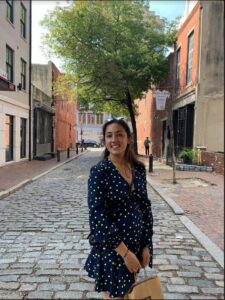This is part of a series of posts by recipients of the 2021 Career Services Summer Funding Grant. We’ve asked funding recipients to reflect on their summer experiences and talk about the industries in which they spent their summer. You can read the entire series here.
This entry is by Vanessa Dib, COL ’22
 Drawing inspiration from my coursework in international politics, I decided to develop and conduct an independent research project on the topic of NGO activism in the field of global environmental politics. Specifically, my inspiration came after I read on the subject of private authority and the role that NGOs increasingly play in global environmental politics. This is due to the various distributional problems and rifts that exist between states in tackling climate change and environmental issues. Additionally, in the literature surrounding global environmental politics or international politics, NGOs are not studied holistically in terms of their roles within the international and domestic landscape. Given all these factors, I thought it would be an intriguing project to conduct a case study on an environmental NGO of my choice, Greenpeace, and examine the strategies and tactics that Greenpeace utilizes to pressure governments to comply with international environmental treaties.
Drawing inspiration from my coursework in international politics, I decided to develop and conduct an independent research project on the topic of NGO activism in the field of global environmental politics. Specifically, my inspiration came after I read on the subject of private authority and the role that NGOs increasingly play in global environmental politics. This is due to the various distributional problems and rifts that exist between states in tackling climate change and environmental issues. Additionally, in the literature surrounding global environmental politics or international politics, NGOs are not studied holistically in terms of their roles within the international and domestic landscape. Given all these factors, I thought it would be an intriguing project to conduct a case study on an environmental NGO of my choice, Greenpeace, and examine the strategies and tactics that Greenpeace utilizes to pressure governments to comply with international environmental treaties.
During the first month of conducting the research, I realized that much of what I thought and knew about global environmental politics was incomplete or simplified. First of all, there are a tremendous number of actors involved whether it be heads of state or governments, NGOs, intergovernmental organizations, corporations, and so on. All of these actors play critical roles in shaping negotiations, signing, and ratification of international environmental treaties. Furthermore, even though I was focusing on the topic of international politics, domestic politics does have an impact on international negotiations and the interactions between head of states. Slowly sifting through the literature, I was able to grapple with the complexity of the issue that I wanted to conduct my research project on. I soon met my first obstacle which was the need to focus on a more specific issue. After brainstorming and speaking with my professor who was supervising my project, I decided to focus on Greenpeace and its campaigns in pressuring the U.S. government to comply with the 1997 Kyoto Protocol.
Over the next two months, through researching archival newspapers, scholarly literature, and even having interviewed a Greenpeace campaign manager, I was able to forge a rudimentary connection between how Greenpeace adapted its strategies in pressuring the U.S. government to comply with the Protocol in the wake of varying domestic political and social landscapes. Though it was tedious to find such a connection, it was exciting to build on the work of Robert O. Putnam’s two level game regarding domestic politics and international diplomacy.
Overall, through the course of conducting my research project, I had to learn and adapt in ways that I have never had the opportunity to do so in my coursework and extracurriculars. Since it was my project, I had to take responsibility in assigning myself tasks and organizing my time in an efficient manner to complete my research. I also had to challenge myself by brainstorming, analyzing, and critical thinking about my work which was novel to me considering I usually have a professor providing instructions. In the end, by pursuing my own research project this summer, it has further fueled my interest in research, as well as my motivation to pursue graduate school in the area of international politics.




